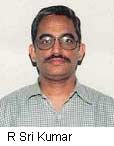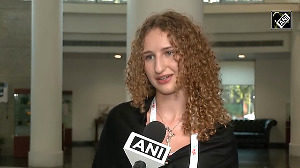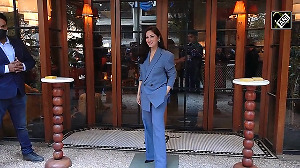
For more than one year, Karnataka Additional Director General of Police R Sri Kumar has been investigating one of the biggest scams India has ever seen -- the fake stamp paper case.
The Stamp Investigation Team -- STAMPIT -- that Sri Kumar heads is still in the process of assessing the magnitude of the scam because its kingpin Abdul Kareem Telgi and his gang members operated in most Indian states.
In an exclusive interview with Deputy Managing Editor George Iype, Sri Kumar discusses the stamp scam, its fallout and how Telgi operated.
How did the Karnataka police come across the stamp paper scam?
It all started three years ago. On August 19, 2000 the Bangalore police received credible information that two persons were carrying fake stamps. We immediately arrested them on Subedar Chatram Road and seized fake stamps and stamp papers. That was the tip of the iceberg.
The police then went on conducting raids in many places in Bangalore. We soon seized fake stamps, fake stamp papers, embossing and franking materials showing a face value of some Rs 9.92 crores (Rs 99.2 million). Our investigation led to the chargesheet of 23 persons. But some of them were absconding.
One of the absconding accused was Abdul Kareem Telgi. He fell into our net in Ajmer, Rajasthan in November 2001. Soon after the arrest of Telgi, the two Houses of the Karnataka legislature were rocked by allegations of involvement of politicians and policemen with the scamster.
So considering the magnitude of the value of the fake stamp papers and stamps sold and circulated by the accused and seeing the sensitiveness and wide ramification of the case and also the alleged huge loss to the state exchequer, the Karnataka government constituted a special investigation team under my direct supervision. The team called STAMPIT has been investigating the case since then. We have now established that Telgi's gang had all India operations.
This seems to be the biggest scam India has ever seen. What is the magnitude of the value of the fake stamp papers and stamps sold and circulated?
It is difficult to estimate the magnitude of the scam. The seizures of fake stamps and stamp papers in the last 18 months is of the order of Rs 3,500 crores (about Rs 35 billion). The exact value can be calculated only by the revenue authorities or the accountant general's office who watch the revenue collections. The magnitude of the scam could be anything from Rs 3,500 crores to many times that amount.
The first cases on the stamp paper scam were registered in 1997. But the police arrested Telgi only in 2001. Why?
Stamp cases have been registered against many persons in the past even before 1997. Our investigations have revealed that Telgi was first introduced to the profitable business of fake stamps by one Ram Rattan Soni, a share broker in Mumbai.
Telgi met Soni accidentally in a police lockup in Mumbai. Telgi had been arrested in December 1993 in a cheating case and while he was in the custody of the Mumbai police, he met Soni who was in lockup in a duplicate share transfer case.
It was here that Telgi is said to have learnt about the profitable business of fake stamps and stamp papers. He soon started his empire of building the fake stamp racket across many states in the country. Telgi obtained a stamp vending licence in Mumbai in March 1994. He was in fact arrested for the first time in a stamp case in June 1995 by the Mumbai police along with Soni.
Did Telgi's name figure in Karnataka police records before 2001?
Telgi became an accused in Karnataka for the first time in 2000. But later his complicity was discovered in an earlier case in the Yeshwantpur police station in Bangalore city which had been registered in June 1999.
You personally presented the magnitude of the scam to the finance ministry. In how many states did Telgi and his group operate?
Either cases are registered or Telgi's operations are known in Andhra Pradesh, Delhi, Goa, Gujarat, Karnataka, Kerala, Maharashtra, Madhya Pradesh, Punjab, Rajasthan, Tamil Nadu, Uttar Pradesh, West Bengal. We suspect Telgi's operations and links in other states like Bihar, Himachal Pradesh, Jharkhand and Orissa.
Telgi is said to have good connections in political and police circles. What have your investigations on Telgi brought forth?
Involvement of some police officials and politicians is under investigation. Quite a few have already been questioned .You will have to wait till our investigations are completed to know the details. Prior publicity would be harmful to the case and will affect the reputations of the concerned.
You have interrogated Telgi. How does he come across during interrogation?
He is shrewd and intelligent and does not easily volunteer information. He confirms only such information which he finds that he cannot deny.
Telgi has made a sensational announcement that he contracted HIV while in police/judicial custody. How do you react to his allegation?
He is trying to create a ground for getting bail on health grounds.
According to Telgi, from August 6, 2003 to August 15, 2003, he was taken to hospital by STAMPIT for treatment and he got 'infected' there.
This is not borne out by the medical records available. In fact, the Pune police recovered his medical records showing him as HIV positive before he was arrested by the Bangalore police in Ajmer in November 2001.
Telgi says since STAMPIT does not have any material to connect him to the scam they intend to eliminate him by keeping him in judicial custody.
We have enough evidence to prove the charge in a court of law. When the trial commences in the court of the special judge, the evidence painstakingly collected by STAMPIT will be unraveled. Suffice it to say that the telephone interceptions got done by STAMPIT is itself enough to prove his criminality. STAMPIT is striving to see that he is punished by a due process of law.
Do you think criminals like Telgi can get AIDS in jails in India? What are the general conditions of jails across the country?
Telgi was tested HIV positive before he was arrested by the Bangalore city police and not in jail. For general conditions on jails, a programme of modernizing jails is underway with 75 percent contribution from the central government and the states bearing 25 percent of the costs.
Telgi's lawyer M T Nanaiah has alleged that STAMPIT has now completely, forcibly stopped all the medical treatment to him?
That is a lie. The medical treatment of inmates in jail is handled by the prisons department with doctors being deputed from the health department. STAMPIT as an investigating agency and we have nothing to do with the medical state of an accused in judicial custody. The Karnataka government has constituted a medical board of three specialists to supervise Telgi's medical treatment while he is lodged in Bangalore jail.
What is the status of the cases against Telgi? How long will it take for a final sentence on the stamp paper scam?
The cases in Karnataka are ready for trial. The cases investigated by the Pune police are also to be ready for trial shortly. The trial may last longer than two years as more than 600 witnesses and 700 documents have to be marked in evidence in our three cases. In between if Telgi is transferred to other states for investigation purposes, the trial may get stalled and delay may result.
What is the worst sentence Telgi can get, considering the fact this is really the biggest scam that India has seen?
For counterfeiting government stamps life sentence is the maximum. He may also get ten years or less for other offences. However he is accused of eliminating one Christopher -- a driver of his who fell out with the gang. If convicted for murder he could be awarded the death penalty. This is a case being handled by the Mumbai police.
It is the first time that an investigating team in the country has created a web site to give details of the cases to the public. What prompted you to set up www.stampit.info? Has it been useful to your investigations?
The web site was started with the idea of inviting the public to give information confidentially about the scamster and his activities. Since, it was known that Telgi was operating in many states, it was felt that a web site in the language of the states he was operating would give an opportunity to the people of that state to share information with us in confidence.
The web site was launched within a fortnight after I took over the investigation to keep the public posted about the progress of investigation.
Unfortunately more comments and abuses have been showered on us than precise intelligence. But the site has been useful in sharing information with the press and other police forces.
Photograph: Indranil Mukherjee/AFP/Getty Images. Design: Dominic Xavier






 © 2025
© 2025